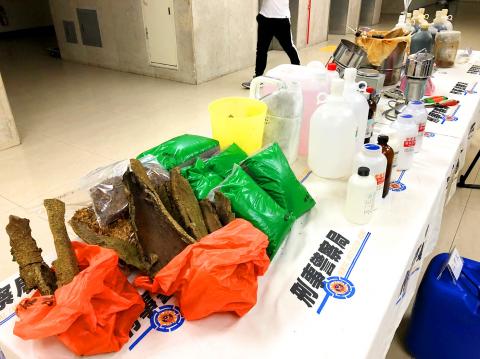Criminal Investigation Bureau (CIB) officials yesterday said they discovered a laboratory used to produce N,N-Dimethyltryptamine (DMT) by distilling the roots and bark of the Acacia confusa tree, during a raid on a home in New Taipei City.
DMT can be consumed as a psychedelic drug.
A complete laboratory set and chemical substances were confiscated during a search of the couple’s home, and a number of pouches containing DMT powder and chopped up plant materials, identified as Acacia confusa bark, roots and leaves were seized, bureau officer Lin You-yu (林佑裕) said.

Photo: Chiu Chun-fu, Taipei Times
Two people are suspected of purchasing DMT from a man surnamed Chen (陳), 41, and his wife, surnamed Chao (趙), 49, investigators said, adding that all four are being questioned and face drug charges.
Although derived from natural materials, DMT is categorized as a Class 2 narcotic under the Narcotics Hazard Prevention Act (毒品危害防制條例), Lin said.
“The couple learned online that the Acacia confusa contains DMT, and gathered information on how to produce DMT about a year ago. After that they made trips to mountainous areas around greater Taipei to collect bark and roots,” Lin said.
They allegedly produced DMT crystals in their homemade lab, then ground them into powder and packaged them as capsules to sell to customers, he said, adding that it is estimated they sold more than NT$1 million (US$31,805) of the drugs in the past year.
“DMT derived from the acacia tree is a new form of recreational drug in Taiwan. It is quite popular in the US and European countries, as the substance can induce hallucinations,” Lin said, adding that it is a dangerous drug and some people have died from taking it.
Bureau officials said that about 170kg of DMT worth NT$900 million at the time had been seized during raids in Taichung in January 2017.
Lin said that this is the first time pure refined DMT powder has been seized in Taiwan.

“China is preparing to invade Taiwan,” Deputy Minister of Foreign Affairs Francois Wu (吳志中) said in an exclusive interview with British media channel Sky News for a special report titled, “Is Taiwan ready for a Chinese invasion?” the Ministry of Foreign Affairs said today in a statement. The 25-minute-long special report by Helen Ann-Smith released yesterday saw Sky News travel to Penghu, Taoyuan and Taipei to discuss the possibility of a Chinese invasion and how Taiwan is preparing for an attack. The film observed emergency response drills, interviewed baseball fans at the Taipei Dome on their views of US President

ECONOMIC BENEFITS: The imports from Belize would replace those from Honduras, whose shrimp exports have dropped 67 percent since cutting ties in 2023 Maintaining ties with Taiwan has economic benefits, Ministry of Foreign Affairs officials said yesterday, citing the approval of frozen whiteleg shrimp imports from Belize by the Food and Drug Administration (FDA) as an example. The FDA on Wednesday approved the tariff-free imports from Belize after the whiteleg shrimp passed the Systematic Inspection of Imported Food, which would continue to boost mutual trade, the ministry said. Taiwan’s annual consumption of whiteleg shrimps stands at 30,000 tonnes, far exceeding domestic production, the ministry said. Taiwan used to fill the gap by importing shrimps from Honduras, but purchases slumped after Tegucigalpa severed diplomatic ties with Taiwan

The Executive Yuan yesterday approved a southwestern extension of the Sanying MRT Line from New Taipei to Bade District (八德) in Taoyuan, with a goal of starting construction by late 2026. The 4.03-kilometer extension, featuring three new stations, will run from the current terminus at Yingtao Fude Station (LB12) in New Taipei City to Dannan Station (LB14), where it will connect with Taoyuan’s Green Line, New Taipei City Metro Corp said in a statement. This extension will follow the completion of core Sanying Line, a 14.29-kilometer medium-capacity system linking Tucheng (土城), Sansia (三峽)

CARGO LOSS: About 50 containers at the stern of the ‘Ever Lunar’ cargo ship went overboard, prompting the temporary closure of the port and disrupting operations Evergreen Marine Corp, Taiwan’s largest container shipper, yesterday said that all crew members aboard the Ever Lunar (長月) were safe after dozens of containers fell overboard off the coast of Peru the previous day. The incident occurred at 9:40am on Friday as the Ever Lunar was anchored and waiting to enter the Port of Callao when it suddenly experienced severe rolling, Evergreen said in a statement. The rolling, which caused the containers to fall, might have been caused by factors including a tsunami triggered by an earthquake in Russia, poor winter sea conditions in South America or a sudden influx of waves,